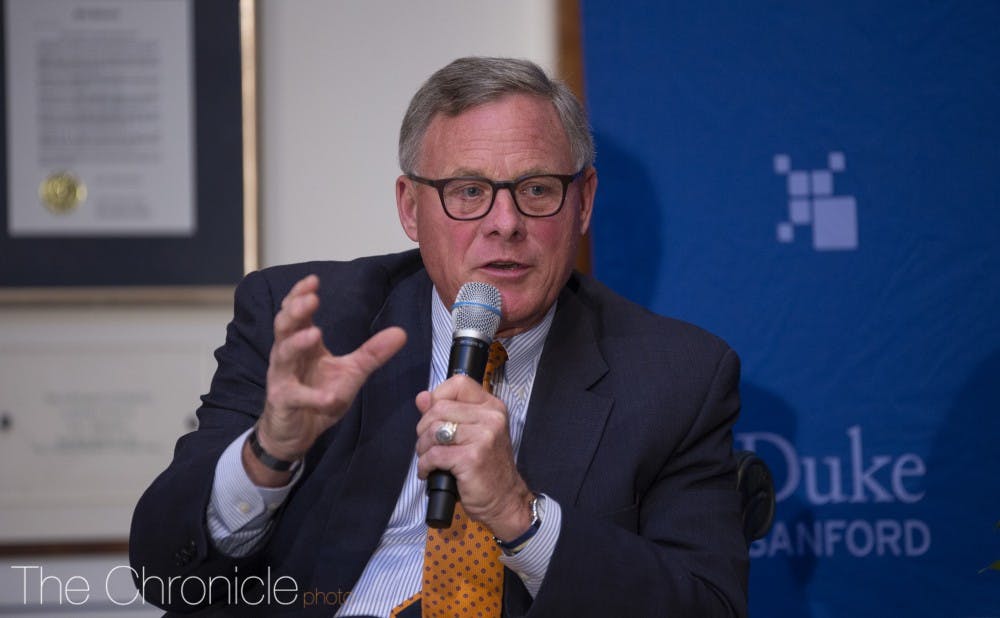Senator Richard Burr (R–NC) sat down with The Chronicle and Sanford Journal, and later fielded questions from various reporters, to discuss his experience in Congress during a visit to campus Monday. The interview has been edited for length and clarity.
The Chronicle: You said in 2016 that you don’t plan to run for re-election in 2022. Is that still the case and, if so, how has it affected your approach to this term?
Richard Burr: Didn’t plan to, not going to. I never dreamed that I was going to be in Washington for up to 28 years. People clamored for term limits—I was never for term limits. I left the House of Representatives after 10 years. It was tough for me not to run for the United States Senate, although that was not planned. North Carolina had a lot invested in me after 10 years in the House—on the House Committee on Energy and Commerce, as vice chairman of the committee at one point. So, I saw this as a benefit for the state that I owed North Carolina. If I hadn’t made that decision in 2016, I certainly would have made that decision after two years of an investigation into Russia, because it has physically and emotionally drained me.
Sanford Journal: Going back to your response about the Russia investigation taking a toll on you….How do you think the findings of the report should be shared with the American public?
RB: As much of it as possible should be public. I think that Attorney General [William] Barr has outlined very well what he should be concerned with, and what he hopefully will be concerned with. It’s three areas: sources and methods that are used for intelligence gathering, grand jury testimony, and ongoing prosecutions...
TC: What do you think are the most pressing issues for North Carolinians?
RB: The top two issues that people should be concerned with are immigration and healthcare. It’s not a wall, it’s fixing our legal immigration system so that people know how to come here legally. It is very difficult for even an American to understand, and it’s very expensive for someone to go through. We eliminate a lot of people that want to come here for the right reasons by making it too onerous and costly...
Reporter: Does your committee plan to follow up with [Special Counsel Robert] Mueller?
RB: We probably won't—it’s probably the jurisdiction of the Judiciary Committee.
Reporter: What does your committee still have to go in its investigation?
RB: We’ve got several individuals still to interview—you might have seen we had one last week. We’ve got a few more and it will probably take 60 days to write a report and another 60 days to go through the redaction and classification process. I’ve said it from the beginning—our work should be as public as it possibly can be. But we still have the same thresholds of protecting sensitive sources and methods and any investigative concerns that we have.
Reporter: Where does that put you guys?
RB: I’d like to have the report out publicly before we leave in August. I’m on that timeline but I haven’t hit timelines in the past. Since we’re not finished, I can’t anticipate today if we’re going to run into anything else, but we have a much smaller deck of individuals and things we have to go through.
Get The Chronicle straight to your inbox
Signup for our weekly newsletter. Cancel at any time.

Managing Editor 2018-19, 2019-2020 Features & Investigations Editor
A member of the class of 2020 hailing from San Mateo, Calif., Ben is The Chronicle's Towerview Editor and Investigations Editor. Outside of the Chronicle, he is a public policy major working towards a journalism certificate, has interned at the Tampa Bay Times and NBC News and frequents Pitchforks.
Bre is a senior political science major from South Carolina, and she is the current video editor, special projects editor and recruitment chair for The Chronicle. She is also an associate photography editor and an investigations editor. Previously, she was the editor-in-chief and local and national news department head.
Twitter: @brebradham
Email: breanna.bradham@duke.edu

